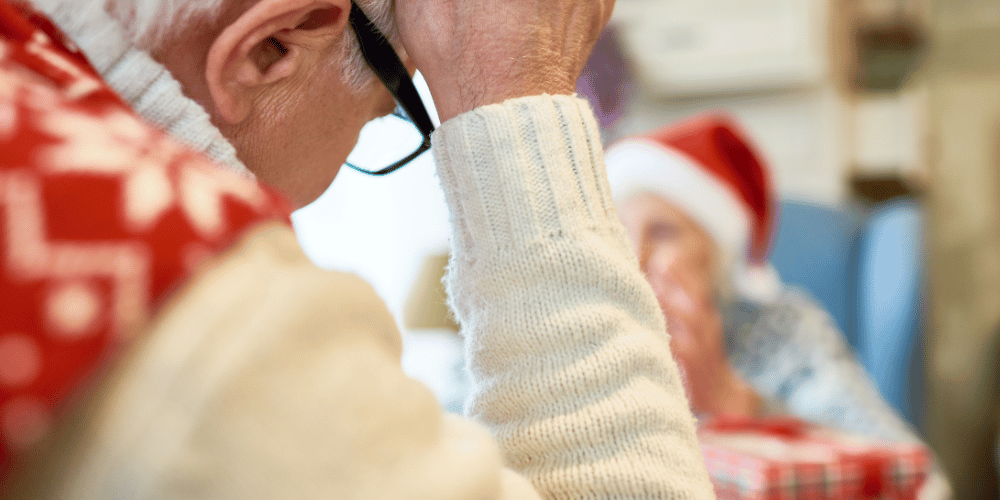
For many, Christmas and the Festive Season is an exciting and magical time—a season of joy where families and friends gather to enjoy good food, exchange gifts, and create cherished memories. But for some, Christmas feels entirely different. It can be a lonely, isolating, and overwhelmingly difficult time of year.
According to a poll by Skipton Building Society, 31% of adults experience sleepless nights due to Christmas-related worries. Additionally, seasonal affective disorder (SAD) affects about a third of people, further compounding stress and mental health struggles during this time. Many patients report feelings of being overwhelmed, anxious, and sleep-deprived.

As healthcare professionals, you are often in a unique position to notice when patients are struggling, even during brief interactions. The festive period can bring additional pressures—both positive and negative—that may worsen a patient’s mental health. Around three in ten adults report a decline in their mental health during the festive season, driven by a range of factors:
Christmas can be an expensive time, with pressures to buy gifts, prepare festive meals, and host celebrations. For some patients, especially those on low incomes, the financial burden can feel insurmountable. A patient may express concerns about affording presents for their children or mention skipping meals to save money for Christmas expenses.
Social isolation is common during the holidays and can stem from various reasons. Patients may live far from family, be working away from home over Christmas, or simply lack a strong social network. Elderly patients, in particular, may feel forgotten, with few or no visitors during this season.
For patients who have experienced bereavement, the festive period can be a painful reminder of loved ones who are no longer with them. They might share memories of past holidays or avoid discussing their plans altogether, indicating their struggle to cope.
Stress can manifest in patients for many reasons—hosting responsibilities, navigating family tensions, or managing unresolved conflicts during gatherings. Even the thought of spending time with difficult relatives can create significant emotional strain.
Patients working long hours during the winter, whether this be healthcare, hospitality, retail etc, they may feel overwhelmed by the demands of their job combined with preparations for Christmas. They might report feeling physically and emotionally drained, struggling to balance work, family, and festivities.

As healthcare professionals, you may be the first person a patient opens up to during the festive season. Being attuned to subtle signs of distress can make a big difference. Here are some indicators that a patient might need support:

While your approach will vary based on your role and area of practice, here are some general ways to provide meaningful support during this time:

It’s easy to forget, but healthcare professionals aren’t immune to the pressures of Christmas. The combination of winter workload pressures and personal responsibilities can leave you feeling just as overwhelmed as the patients you care for. Recognising this is crucial, as it’s impossible to pour from an empty cup.
Take a moment to reflect on your own well-being during this season. Are you trying to do too much? Whether it’s juggling long shifts, preparing for family gatherings, or managing your own holiday expectations, the strain can quickly add up. It’s okay to set boundaries. Saying no to extra commitments or scaling back holiday plans doesn’t make you any less capable or caring.
Remember to be kind to yourself and look at yourselves, all year round but especially at periods like Christmas where it can become increasingly more difficult.

Different work environments will have varying protocols for referring individuals who show signs of mental health deterioration. While some patients may require a referral to mental health services, others might simply need guidance, reassurance, or general support to help them through challenging times.
It’s also important to remember that, as healthcare professionals, we are not immune to the pressures of the festive season. In fact, the demands of this time of year may make it even more vital to seek support when needed. Exploring the resources below could provide valuable insights or tools to assist both your patients and yourself. This is not an exhaustive list, but it offers a starting point for finding help if needed.

The festive season can be a time of joy and togetherness, but it often brings challenges that may weigh heavily on some. Primary care nurses play a crucial role in recognising the signs of mental health difficulties and providing the support that patients might need during this season. Whether it’s through offering a listening ear, encouraging self-care, or guiding patients towards practical steps, the impact of empathetic care can be profound.
It’s also essential to acknowledge that nurses themselves are not immune to the pressures of the festive period. The demands of work, combined with personal responsibilities, can take a toll. Taking time to set boundaries, seek support, and prioritise self-care is vital in maintaining both personal well-being and the ability to provide the best possible care for others.
Through understanding and thoughtful action, healthcare professionals have the opportunity to make a real difference—not just for their patients but also for themselves—ensuring that no one feels overlooked or unsupported during this time of year.
This Mental Health Awareness Training raises awareness of ill-mental health (particularly stress, depression and anxiety), provides tools and guidance for daily wellbeing-management, and aims to remove the stigma surrounding mental health.
Giving you written and video content to answer all your questions on primary care education from Phlebotomy to Travel Health.
Subscribe now to be kept updated with our latest posts and insights.
Start typing to search courses, articles, videos, and more.